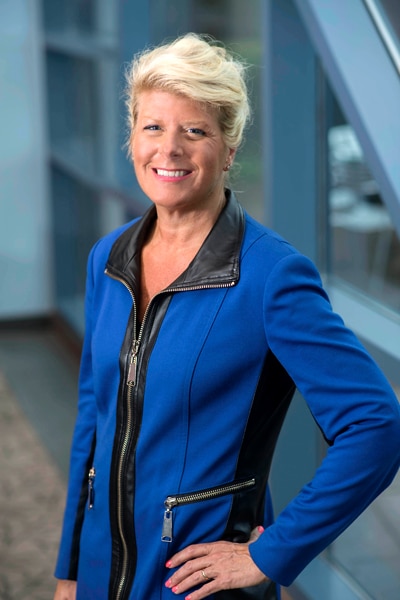
Michele D’Alessandro grew up in Somerset County, the hub of Central New Jersey. A stone’s throw from the heart of the nation’s largest metropolitan area of New York, the area is also a hotbed of the pharmaceutical industry. She was immediately drawn to math and computer science, earning degrees at Rutgers University in those fields, as well as an MBA. And while she has made her career in the STEM field—to the point of becoming vice president and CIO of manufacturing IT at pharmaceutical giant Merck—D’Alessandro knows that many women don’t have the same access or encouragement to pursue math and sciences.
“Both IT and manufacturing are in need of increased gender diversity, and that’s even more evident at the intersection,” D’Alessandro says. She also knows there’s still a long way to go, and she wants to do everything she can to change it. “We’re starting to see early career diversity, but the challenge we have is that we haven’t had that pipeline strength reaching the more senior levels in the organization,” she continues.
When D’Alessandro entered the workforce, she knew she wanted to be part of a field rooted in improving the health of the community—even if it wasn’t necessarily a traditional path for a woman in business. In her first role working in software development focused on employee health outcomes, she quickly rose through the ranks toward designing systems and architecture, as well as managing teams.
“I got to see the commercial side of pharmaceuticals, as well as the manufacturing side,” D’Alessandro recalls. “The more I got to see, the more I came to appreciate how technology could drive business change.”
While seeing both sides of the business allowed D’Alessandro a unique perspective, she encourages young women to also explore and experience roles both intensely focused on a single business area and roles that focus on how the strength of technology can benefit the business at large.
“Often, these are the groups that have to run a lot of the solutions that the business IT folks develop. And if you’ve never done it, then you don’t have an appreciation of what it takes,” she says.
Each day, D’Alessandro’s role ranges from working with the leadership team to determining strategies to run her global IT team. Generally, the two cornerstones of Merck’s IT portfolio are the operational work that its teams are doing and the new project work, she says. Additionally, D’Alessandro leads an IT team to focus heavily on building resilience to prevent security breaches, as well as driving strategy to design and build out next-generation capabilities in areas such as smart manufacturing and paperless activities.
She takes a hands-on approach in both ends of her resources, going out among the various teams across the vast organization to create the best environment for each to be successful. D’Alessandro works on resourcing for financial and organizational needs to ensure coaching, mentoring, and building the next set of leaders—especially when it comes to building diversity throughout Merck.
While that diverse experience is key to D’Alessandro’s ability to help Merck run the best manufacturing processes for pharmaceuticals, diversity at business scale can make an even greater difference. “We’ve been demanding ourselves to take some risk at the more senior levels to drive diversity,” she explains. “There’s statistic, financial proof that leadership teams tend to be healthier from an interpersonal perspective when you diversify in gender.”
That push has come both in organically driving academic and curriculum work for women, as well as in actively stepping into the senior level teams to ensure diversity.
“Sadly, many women self-select out of the STEM fields because they feel alone. So, a big part of the role I play is actually linking with folks to encourage them and show them that women can be very successful,” D’Alessandro says. That work is important at Merck, but D’Alessandro also shares that initiative beyond the company and takes a leadership voice at organizations and programs such as the National Center for Women & Information Technology. “My goal is to get these successful women on stage, in front of groups, and get them talking more about their life experiences,” she continues. “Coaching and mentoring is absolutely crucial.”
Additionally, D’Alessandro serves on the advisory board for the big data program at her alma mater, Rutgers University. In that work, she can directly look into any gaps in building a pipeline to ensure more diverse STEM colleagues and, ultimately, a more diverse senior leadership base in corporate America, as well as what can be done to fill those gaps.
“I’ll work with the schools and find out what they’re missing in their curriculum,” she says. “We’ve learned academia needs to focus more on advanced analytics applied to a business setting. We have also learned the specialized curriculums in applied automation technology is a gap.” With that knowledge, D’Alessandro and the board, as well as other academic partners, are able to bring business case studies into the classroom and help students co-create solutions.
Merck’s commitment to those diversity and education efforts is a major reason why D’Alessandro has been with the company for nearly twenty-five years. She started as a technical analyst in 1993 and has continued to showcase the influence and strength that women in leadership can provide in the industry.
“Merck has been recognized for their approach to not only gender diversity, but also diversity more broadly. Whether diversity of thought, culture, experience, nationality, ethnicity, geography, or any other factor, the company has been widely recognized for creating a diverse environment and ways of operating,” D’Alessandro says. Managers are also required to undergo sensitivity training, and leadership invests heavily in education and cultural resources, including leadership programs focused on diversity and inclusion.
D’Alessandro is especially proud of the way Merck treats its employees after a diverse group is brought into the fold. The company sponsors ten employee resource groups that bring people together under shared interests and passions. “It can be something simply activity-based, such as cycling events, or as profound as the Asia-Pacific Association,” she says.
Throughout her career, both in diversity efforts and technology, D’Alessandro is focused on helping people—whether internally at Merck, through aspiring women leaders at large, or the patients who are seeing the benefits of better Merck manufacturing. “We’re often not talking about technology issues—we’re talking about people issues,” D’Alessandro says. “People need to see the change curve in order to process and perform their best as a whole, complex human.”
Looking ahead, D’Alessandro continues to strive for teams that are thriving and healthy for everyone, and she looks forward to the scales tipping for women in technology and diversity more broadly.
Photo: Faith West
“Life sciences companies are facing unprecedented change with shifts in technology and moves toward personalized medicine. Merck recognizes these changes, and together we bring innovation into everything we do. Using capabilities such as automation, analytics, and collaborative industry platforms, Merck will not only ‘go digital,’ but truly ‘be digital.’” —Brad Pawlowski, Managing Director, Accenture Life Sciences–Supply Chain
EY is a global leader in advisory, tax, transaction, and assurance services, and is building a better working world by helping clients like Merck solve their most complex issues such as creating growth, managing cost, and efficiency, responding to market pressures and regulation and resolving operational challenges in the supply chain.
HCL values “Relationship Beyond the Contract” and is proud to be the strategic technology partner to Merck Manufacturing Division.

